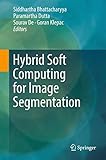Hybrid Soft Computing for Image Segmentation [electronic resource] / edited by Siddhartha Bhattacharyya, Paramartha Dutta, Sourav De, Goran Klepac.
Contributor(s): Bhattacharyya, Siddhartha [editor.] | Dutta, Paramartha [editor.] | De, Sourav [editor.] | Klepac, Goran [editor.] | SpringerLink (Online service).
Material type: BookPublisher: Cham : Springer International Publishing : Imprint: Springer, 2016Description: XVI, 321 p. 162 illus., 87 illus. in color. online resource.Content type: text Media type: computer Carrier type: online resourceISBN: 9783319472232.Subject(s): Computer science | Artificial intelligence | Computer graphics | Computational intelligence | Computer Science | Artificial Intelligence (incl. Robotics) | Computational Intelligence | Computer Imaging, Vision, Pattern Recognition and GraphicsAdditional physical formats: Printed edition:: No titleDDC classification: 006.3 Online resources: Click here to access online
BookPublisher: Cham : Springer International Publishing : Imprint: Springer, 2016Description: XVI, 321 p. 162 illus., 87 illus. in color. online resource.Content type: text Media type: computer Carrier type: online resourceISBN: 9783319472232.Subject(s): Computer science | Artificial intelligence | Computer graphics | Computational intelligence | Computer Science | Artificial Intelligence (incl. Robotics) | Computational Intelligence | Computer Imaging, Vision, Pattern Recognition and GraphicsAdditional physical formats: Printed edition:: No titleDDC classification: 006.3 Online resources: Click here to access online Hybrid Soft Computing Techniques for Image Segmentation: Fundamentals and Applications -- Enhanced Rough-Fuzzy C-Means Algorithm for Image Segmentation -- Intuitionistic Fuzzy C-means Clustering Algorithm for Brain Image Segmentation -- Automatic Segmentation Approaches -- Modified Level Set Segmentation -- Fuzzy Deformable Models for 3D Segmentation of Brain Structures -- Rough Sets for Probabilistic Model Based Image Segmentation -- Segmentation of Cerebral Images. .
This book proposes soft computing techniques for segmenting real-life images in applications such as image processing, image mining, video surveillance, and intelligent transportation systems. The book suggests hybrids deriving from three main approaches: fuzzy systems, primarily used for handling real-life problems that involve uncertainty; artificial neural networks, usually applied for machine cognition, learning, and recognition; and evolutionary computation, mainly used for search, exploration, efficient exploitation of contextual information, and optimization. The contributed chapters discuss both the strengths and the weaknesses of the approaches, and the book will be valuable for researchers and graduate students in the domains of image processing and computational intelligence.


There are no comments for this item.